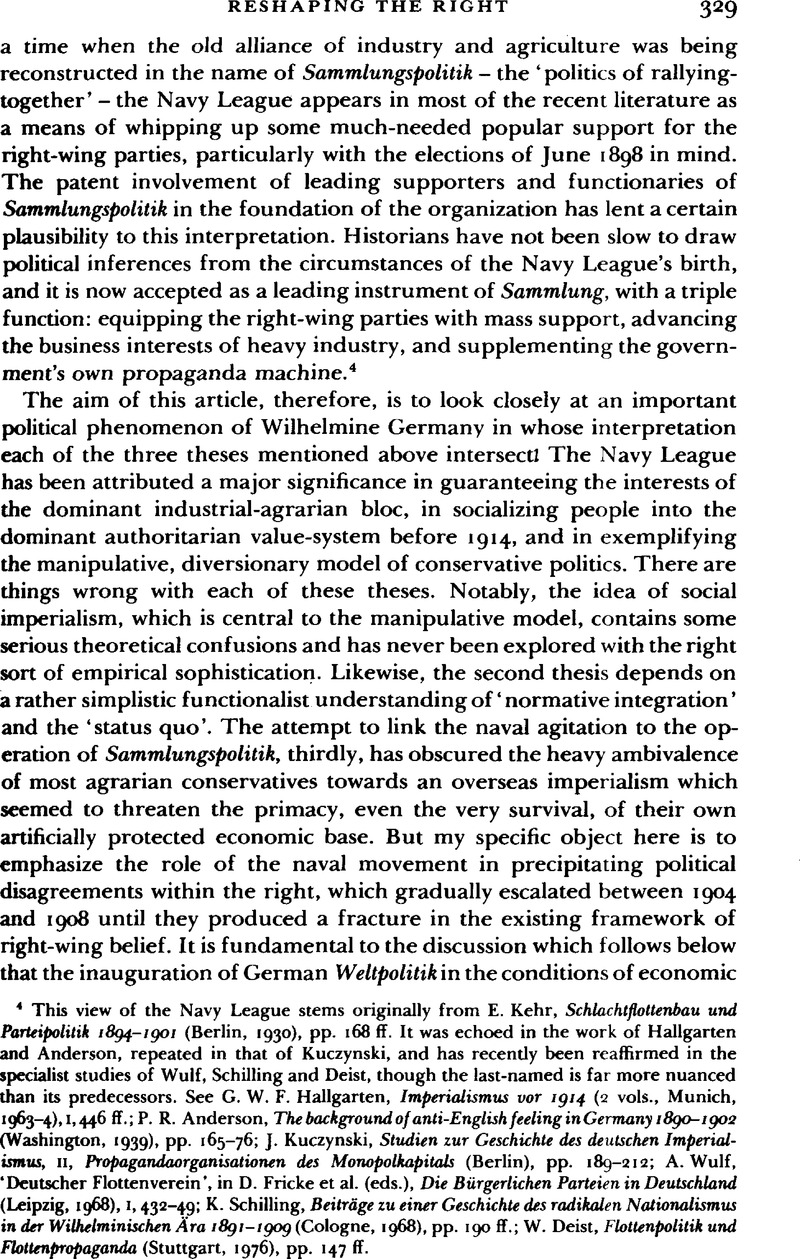Article contents
Reshaping the Right: Radical Nationalism and the German Navy League, 1898–1908
Published online by Cambridge University Press: 11 February 2009
Abstract

- Type
- Articles
- Information
- Copyright
- Copyright © Cambridge University Press 1978
References
4 This view of the Navy League stems originally from Kehr, E., Schlachtflottenbau und Parteipolitik 1894–1901 (Berlin, 1930), pp. 168 ff.Google Scholar It was echoed in the work of Hallgarten and Anderson, repeated in that of Kuczynski, and has recently been reaffirmed in the specialist studies of Wulf, Schilling and Deist, though the last-named is far more nuanced than its predecessors. See Hallgarten, G. W. F., Imperialismus vor 1914 (2 vols., Munich, 1963–1964), 1,446ff.Google Scholar; Anderson, P. R., The background of anti-English feeling in Germany 1890–1902 (Washington, 1939), pp. 165–76Google Scholar; Kuczynski, J., Studien zur Geschichte des deutschen Imperialismus, II, Propagandaorganisationen des Monopolkapitals (Berlin), pp. 189–212Google Scholar; Wulf, A., ‘Deutscher Flottenverein’, in Fricke, D. et al. (eds.), Die Bürgerlichen Parteien in Deutschland (Leipzig, 1968), 1,432–49Google Scholar; Schilling, K., Beiträge zu einer Geschichte des radikalen Nationalisms in der Wilhelminischen Ära 1891–1909 (Cologne, 1968), pp. 190 ff.Google Scholar; Deist, W., Flottenpolitik und Flottenpropaganda (Stuttgart, 1976), pp. 147 ff.Google Scholar
5 The following is based to a large extent on my unpublished Sussex D. Phil, thesis, ‘The German Navy League in German politics, 1898–1914’ (1974). It should also be read in conjunction with my essay: ‘Defining social imperialism: use and abuse of an idea’, Social History, I, 3 (1976), 265–90.Google Scholar
6 The best general introduction to the Navy League is Wulf, ‘Deutscher Flottenverein’. For details of the foundation itself, see Eley, , ‘German Navy League’, pp. 49–63Google Scholar. For the background of naval policy: Berghahn, Tirpitz-Plan; Deist, Flottenpolitik; Steinberg, J., Yesterday's deterrent (London, 1965).Google Scholar
7 The membership of the Pan-German League stabilized at around 20,000 before 1914, that of the Colonial Society at around 40,000.
20 Würtzburg, ibid. p. 10.
21 Address to Bav. Del. meeting, Munich, 29 May 1904, Verhandlungen, p. 20, copy in BA-MA, F. 2276, 94229.
22 Hermann Rassow (Burg) in the general board, Dresden, 16 Apr. 1904, Verhandlungen, p. 16, copy in B A, ZSg 1, 195/2.
23 Otto Stern (Beuthen) to the presidium, 23 Apr. 1907, Bayerisches Hauptstaatsarchiv (BHSA), II, Gesandschaft Berlin, 1158.
24 The phrases are taken partly from the Stroschein Manuskript cited in note 15 above, and partly from the following: Stern to Holleben, 19 Nov. 1905, BA–MA, F. 2276, 94229; circular letter produced by Hermann Heydweiller (Denzerheide), May 1907, copy in Staatsarchiv (SA) Hamburg, DFV, III, 49.
25 Breuer (Wiesbaden) in the Danzig congress, 14 June 1908, Protokoll, p. 12, copy in BA–MA, F. 2278, 94237.
26 For a more detailed discussion see ch. 5c of my thesis: ‘Populists and radical conservatives’.
27 Again the details are discussed more fully in ch. 5b of my thesis: ‘Moderates and governmentalists’. But see especially the explicit statements in Wurtzburg to Boy–Ed, 5 Apr. 1908 and in the three undated memoranda sent by Würtzburg to Boy–Ed on 15 Mar. 1908, all in BA–MA, F. 2278, 94237.
28 See for instance August Keim's statements in the general board, Berlin, 2 Dec. 1905, Verhandlungen, p. 6, copy in BA–MA, F. 2277, 94234.
29 See the statements of Würtzburg and Braun in the Cassel congress, 19 Jan. 1908, Verhandlungen, pp. 10, 37 ff., copy in GLA Karlsruhe, 69P, 8.
30 Röper (Berlin-Brandenburg) to Bülow, 21 Dec. 1907, Zentrales Staatsarchiv (ZStA) Potsdam, Rkz., 2261: 203 ff.
31 Statement to the Cassel congress, 19 Jan. 1908, Verhandlungen, p. 11.
32 Heydweiller, ibid. p. 14.
33 The fullest discussion of the character of the parties before 1914 is in Nipperdey, T., Die Organisation der deutschen Parteien vor 1918 (Düsseldorf, 1961)Google Scholar. See also the following essays: Nipperdey, , ‘Interessenverbände und Parteien in Deutschland vor dem Ersten Weltkrieg’, in Wehler, H.-U. (ed.), Moderne deutsche Sozialgeschichte (Cologne, 1966), pp, 369–88Google Scholar; Nipperdey, , ‘Grundprobleme der Deutschen Parteigeschichte im 19, Jahrhundert’, in Ritter, G. A. (ed.), Deutsche Parteien vor 1918 (Cologne, 1973), pp. 32–55Google Scholar; Puhle, H.-J., ‘Parlament, Parteien und Interessenverbände 1890–1914.’, in Stürmer, Das kaiserliche Deutschland, pp. 340–77.Google Scholar
34 Lambi, I. N., ‘Die Schutzzollagitation der deutschen Eisen- und Stahlindustrie 1873–1879’, in Böhme, Reichsgründungszeit, pp. 317–27Google Scholar; Schulz, G., ‘Über Entstehung und Formen von Interessengruppen in Deutschland seit Beginn der Industrialisierung’, in Varain, H. J. (ed.), Interessenverbände in Deutschland (Cologne, 1973), pp. 25–54Google Scholar; Fischer, W., ‘Staatsverwaltung und Interessenverbände in Deutschen Reich 1871–1914’, in Wirtschaft und Gesellschaft im Zeitalter der Industrialisierung (Göttingen, 1972), pp. 194–213CrossRefGoogle Scholar; Kaelble, H., ‘Industrielle Interessenverbände vor 1914’, in Rüegg, W. and Neuloh, O. (eds.), Zur soziologischen Theorie und Analyse des 19. Jahrhunderts (Göttingen, 1971), pp. 180–92.Google Scholar
35 Puhle, H.-J., Von der Agrarkrise zum Präfaschismus. Thesen zum Stellenwert der agrarischen Interessenverbände in der Politik am Ende des 19. Jahrhunderts (Wiesbaden, 1972)Google Scholar; Winkler, H. A., Pluralismus oder Protektionismus? Verfassungspolitische Probleme des Verbandswesens im Deutschen Kaiserreich (Wiesbaden, 1972)Google Scholar; Blackbourn, D. G., ‘The political alignment of the Centre party in Wilhelmine Germany: a study of the party's emergence in nineteenthcentury Württemberg’, Historical Journal, XVIII, 4 (1975).Google Scholar
- 8
- Cited by




